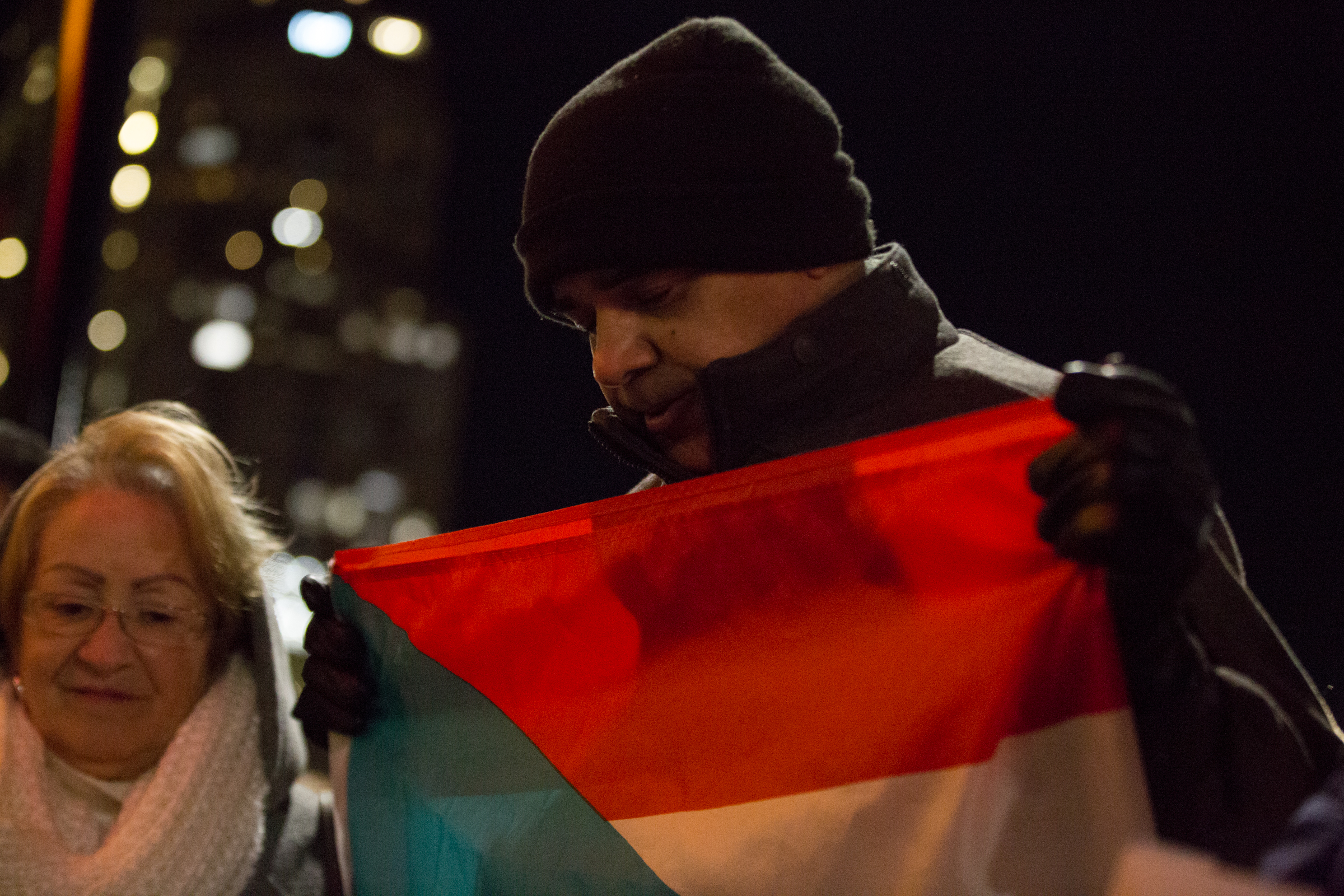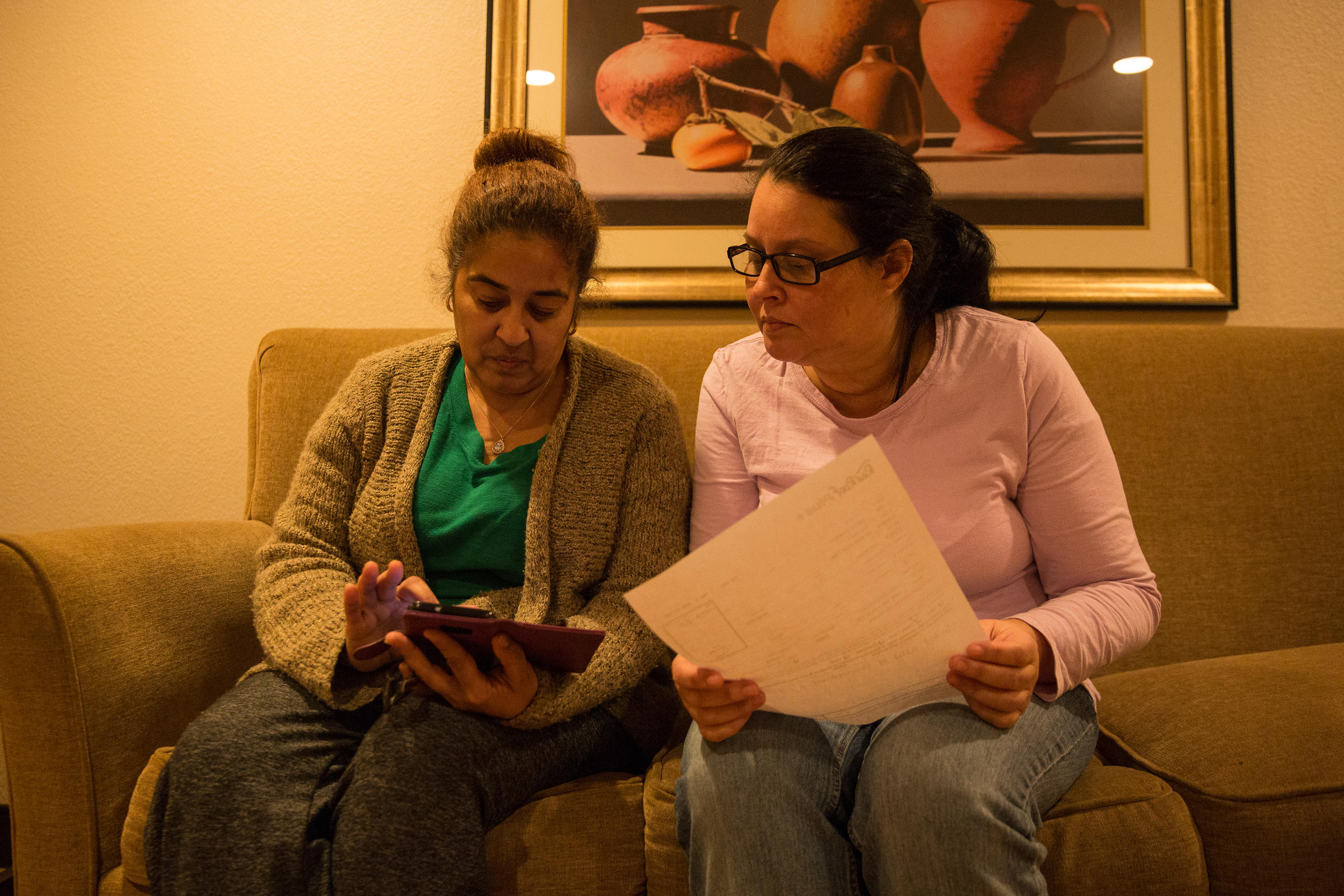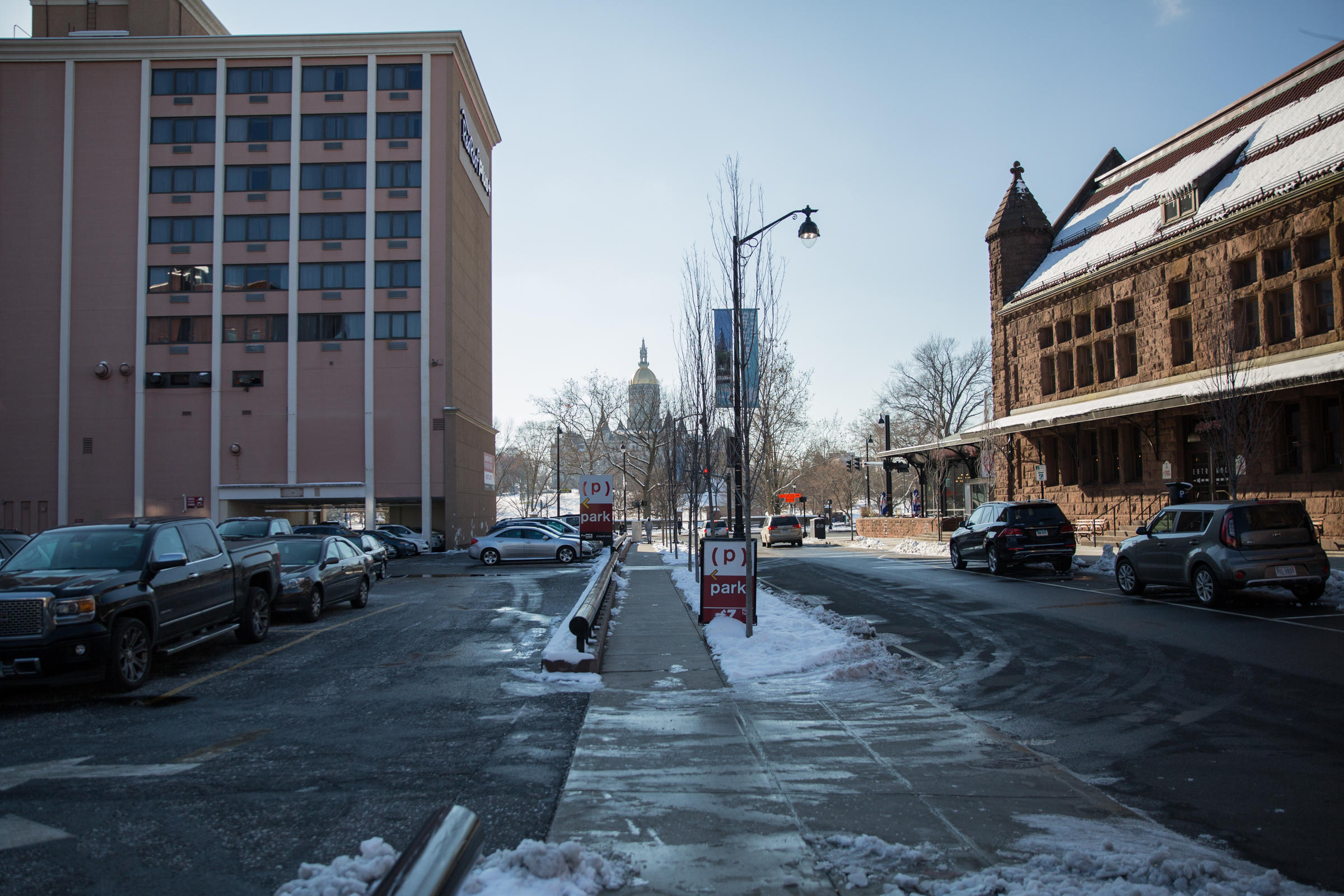Bad Policies Could Add To The Homeless Numbers In New England

State Representatives Angel Arce and Minnie Gonzalez attend a vigil at the Hartford hotel where dozens of Puerto Rican hurricane evacuees have been living since the storm. Photo by Ryan Caron King for WNPR
OPINION
The rooms at Red Roof Plus+ in Hartford don’t have kitchens, and the families who sought shelter there after Hurricane Maria’s destruction want home-cooked meals. Since they arrived, the families have managed to borrow kitchens around the city.
This evening, Carmen Cotto, who retired from Hartford and returned to her family home in Cidra a year ago, is in the hotel lobby waiting for this evening’s cooked meals to arrive.
All around, children are playing while the grownups sit quietly chatting. Cotto is holding her terrier, Nemo, but the dog is agitated over the presence of another dog, so Cotto hands the squirming animal to another woman, with Cotto’s room keys, so Nemo can go where it’s quiet.

Hurricane Evacuees Carmen Cotto and Wanda Ortiz read through emails sent to them on January 18 when city officials were trying to work out logistics for the families to stay at the hotel after FEMA said it was ending funding that day. Photo by Ryan Caron King for WNPR
Cotto worked for years in Hartford, including part ownership in a popular family-owned coffee shop, La Paloma Sabanera, and working with grandparents raising grandchildren. After the hurricane, she and her elderly parents fled north.
Cotto has become something of la madrina – godmother — for her fellow evacuees, patting little girls’ hair, serving as translator, and occasionally calling 911 when someone can’t take the pressure any more.
The hurricane was traumatic enough, but then there’s been the unbearably bad response of the Federal Emergency Management Agency, which earlier this month announced that they would no longer pay for the evacuees’ rooms, that they would rescind their transitional shelter assistance for the Puerto Rican families. That could leave those families – including a weeks’ old infant — homeless. FEMA’s announcement came with no warning. In fact, hotel staff members were told to kick the families out with just a few hours’ notice. When one Hartford hotel worker told a FEMA representative that it was heartless to push families with children onto the streets, the worker said the FEMA representative said to do it, anyway.
After a huge outcry – that included Conn. Gov. Dannel P. Malloy’s calling the situation “outrageous and unacceptable,” the federal government announced it would continue funding the rooms for a while, but then rescinded that little sliver of kindness.
The state has promised to step in, but precisely who is running FEMA, do you think? And why would a federal agency push policies that run counter to decency — and could jeopardize states’ pushes to end homelessness.
Beyond the inhumanity of FEMA’s actions, ripping the room keys from these families could put pressure on states’ homeless response system, said Lisa Tepper Bates, executive director of the Connecticut Coalition to End Homelessness, which earlier sent out a special guidance to its member agencies on how to register evacuees from the island. Conversations began months ago among homeless service providers, social service agencies, and policy makers to come up with a way to meet the needs of evacuees from disasters such as Maria, including housing. But there’s no system in place yet.
“There’s got to be a robust response,” said Bates, “or all these people are coming to the homeless system — that’s not fair to them, and it could put untenable stress on the homeless system, at the very time that we are starting to turn the curve and drive down homelessness in our state.”

Several Puerto Rican families live in the Red Roof Inn, left, in Hartford under FEMA’s Transitional Sheltering Assistance Program. Photo by Ryan Caron King for WNPR
According to FEMA, as of last week New England had roughly 5,182 evacuees, including nearly 3,000 in Massachusetts, and nearly 2,000 in Connecticut. Some 803 rooms are being used. Connecticut’s United Way 211, which handles all incoming calls from people looking for housing, reported 184 calls last week.
And here is where things really stop making sense.
In May 2011, one of the largest tornado ever measured slammed into Joplin, Mo., my hometown, and a third of the town was blown to thunder, and 158 were killed, including Johnnie Richey, a sweetheart of a guy whom I used to race on the playground when we were kids.
I flew out as fast as I could. You can look at photos in the news, but being there was a whole different kind of hell. The tornado cut a 13-by-1 mile swatch through the southwest Missouri town, and by the time I arrived – to give blood, to hand out meals, to try to remember what things looked like before — the place was flooded with volunteers from everywhere. A shell of a house in southern Joplin remained, and people started signing their names to the hollowed-out walls. There were signatures from Los Angeles. Seattle. And – yes – Puerto Rico.
Granted, Puerto Rico is an island, with challenges for recovery you can’t even imagine. But since May 2011, I compare every disaster response to the incredible and beautiful thing that happened in Joplin.
Pres. Obama came out to celebrate that next year’s Joplin High School graduates, and he gave a speech that included the refrain, “Because you are from Joplin” (you’ll remember what it is to be the recipient of unimaginable kindness, and you’ll always pay it forward). The tornado had hit, as Pres. Obama said, just hours after the 2011 graduates had walked across the stage. And here the next year’s seniors were, standing tall. They’d been the recipients of everyone from a Colorado man who came to town toting his three small children and a chain saw, and a man from Japan who’d come because he remembered how Americans had pitched in after one of his country’s disasters. And then there were the United Arab Emirates, who donated laptops to the high school. The list goes on.
It was stunning, and the only time members of my family cried was when they talked about the kindness of strangers who fell over themselves to help.
By comparison, Hurricane Maria slammed in to Puerto Rico, killed more than 1,000 people, and left, according to most estimates, roughly $85 billion in damages. In response, Pres. Trump sent a series of tweets that said the federal government would not be helping Puerto Rico forever, and then he engaged in a Twitter fight with the mayor of San Juan, Carmen Yulín Cruz.
Meanwhile, Puerto Rican evacuees in Hartford continue to get mixed signals from FEMA about the state of their homes back on the island, and at this point, why would they believe anything from the federal government?
After Nemo is safely tucked in upstairs, an older gentleman walked up to say hello to Cotto. He has muscular dystrophy and diabetes. The group includes two veterans, one of whom is 80 years old. Cotto has called 911 three different times for three people who’ve needed medical attention over the trauma from Puerto Rico, never mind the trauma being inflicted on them by their government.
Fortunately, Cotto was raised strong. But she and others like her are going to need some help, before they slip into the state’s homeless system. Connecticut has done some amazing things to prevent and end homeless, but which can hardly afford to pick up what the federal government dropped.
